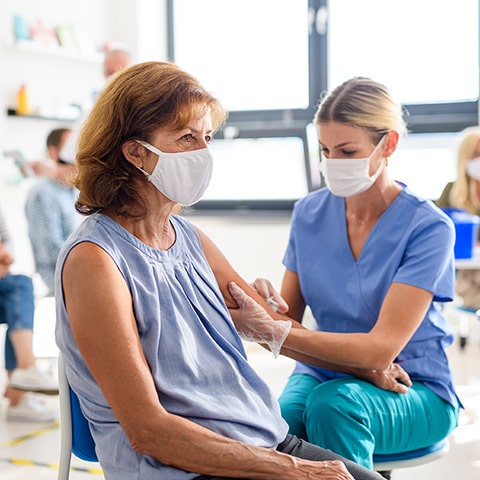
Sepsis is a severe and potentially life-threatening condition that can arise from various types of infections. It occurs when the body's immune response to an infection goes awry, leading to widespread inflammation and organ dysfunction. While sepsis can affect people of all ages, it poses a particular risk to the elderly, who are more vulnerable due to weakened immune responses.
The mechanics of sepsis
Find YOUR ideal care home NOW!
Sepsis occurs when the body's immune system, in its attempt to fight an infection, releases a surge of chemicals into the bloodstream. These chemicals, intended to combat the infection, can trigger an inflammatory response throughout the entire body. In sepsis, the inflammation becomes uncontrolled and can lead to a cascade of events, including blood clotting, decreased blood flow to vital organs, and damage to tissues.
Elderly susceptibility
The elderly are at higher risk of sepsis for several reasons:
-
Weakened immune system: As people age, their immune systems may not respond as robustly to infections. This makes it more challenging to control and resolve infections, increasing the likelihood of sepsis.
-
Chronic health conditions: Elderly individuals often have chronic medical conditions, such as diabetes, heart disease, or respiratory problems, which can make them more susceptible to infections that may progress to sepsis.
-
Reduced mobility: Limited mobility, as seen in some elderly individuals, can lead to conditions like pressure ulcers or urinary tract infections, which are known sources of sepsis.
-
Multiple sedications: Elderly individuals may be on multiple medications, which can interact and potentially compromise the immune system.
Recognizing the symptoms
Sepsis can develop rapidly, and early recognition is critical for effective treatment. Common symptoms include:
- Fever or hypothermia (low body temperature)
- Rapid heart rate
- Rapid breathing
- Confusion or disorientation
- Extreme weakness or fatigue
- Shortness of breath
- Low blood pressure
If you or a loved one experience these symptoms, especially in the context of an infection, seek immediate medical attention.
Treatment and prevention
Sepsis is a medical emergency, and treatment often involves hospitalization. Healthcare providers administer antibiotics to target the underlying infection, intravenous fluids to maintain blood pressure, and other supportive care.
Preventing sepsis, especially in the elderly, involves good hygiene, prompt treatment of infections, and vaccination against preventable diseases. It's crucial to maintain overall health, manage chronic conditions, and seek regular medical check-ups to address any potential sources of infection proactively.
Symptoms and Severity Levels of Sepsis
| Symptom | Severity Level | Recommended Action |
|---|---|---|
| Fever or Hypothermia | Moderate | Monitor closely and seek medical advice if persistent. |
| Rapid Heart Rate | Moderate to Severe | If accompanied by other symptoms, seek urgent medical attention. |
| Rapid Breathing | Severe | Requires immediate medical evaluation. |
| Confusion or Disorientation | Severe | Seek emergency medical help immediately. |
| Low Blood Pressure | Critical | Medical emergency—call for urgent care. |
In conclusion, sepsis is a critical concern that can arise from any infection, posing a serious threat to health and well-being. The elderly, with their weakened immune responses, must take extra precautions to prevent infections and seek prompt medical attention when necessary. Early recognition and effective treatment are essential to improving the chances of recovery and reducing the impact of sepsis in this vulnerable population.
FAQ: Sepsis in Seniors
1. What causes sepsis in the elderly?
Sepsis is usually caused by bacterial infections, such as pneumonia, urinary tract infections (UTIs), or infected wounds.
2. What are the early warning signs of sepsis?
Early symptoms include fever, rapid breathing, confusion, and extreme fatigue.
3. How quickly does sepsis progress?
Sepsis can worsen rapidly, leading to severe complications within hours if not treated promptly.
4. Why are elderly individuals more prone to sepsis?
Weakened immune systems, chronic illnesses, and reduced mobility increase the risk of infections that can lead to sepsis.
5. Can sepsis be treated at home?
No, sepsis is a medical emergency and requires hospital treatment with IV antibiotics and fluids.
6. What is the survival rate of sepsis in seniors?
Survival depends on how early treatment is given. Severe cases have a high mortality rate, especially if untreated.
7. How can sepsis be prevented?
Good hygiene, vaccinations, timely treatment of infections, and regular health monitoring can help prevent sepsis.
8. What happens if sepsis is left untreated?
Untreated sepsis can lead to septic shock, organ failure, and death.
9. How long does recovery from sepsis take?
Recovery varies; mild cases may resolve in weeks, while severe cases can take months and require rehabilitation.
10. Is sepsis contagious?
No, sepsis itself is not contagious, but the underlying infections that cause it can be.
We are here to help you choose a care home or facility best suited to your needs. Do not hesitate to contact us on the following number: 0230 608 0055 or fill out this form.
Do you need a care home for yourself or your loved one?
Share this article :
Latest posts
You are looking for an establishment for your loved one ?
Get availability & prices
Fill in this form and receive
all the essential information
We would like to inform you of the existence of the opposition list for telephone canvassing.

.webp)









